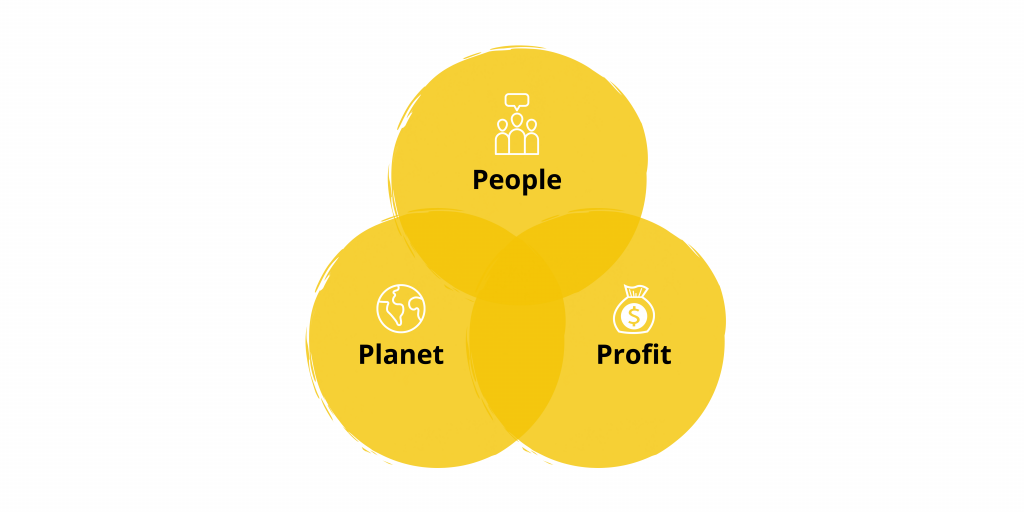What is Impact Entrepreneurship?
The Business of Business
It was once said by a very influential, very ideological (then) young man:
The business of business is business.
Essentially, what that meant was that if a business just focused on turning a profit for its shareholders and providing employment for its workforce, it was doing all that it was supposed to, and performing a very helpful role in society at that. The idea was so influential in fact that many businesses continue to define their responsibilities as such even today.
This attitude could arguably be justified in a time before human-caused global warming had been identified and the internet age had highlighted the endless systemic inequalities visible in today’s world. But as the climate crisis stubbornly refuses to be ignored out of existence and ever more political and social issues and tensions dominate our daily newsfeeds, there is a growing realisation of the role that business has to play in all of this.
That is, businesses can no longer justify focusing narrowly on their own affairs because we have become so much more aware of their connection to the broader systems around them and to society as a whole. They can no longer fail to account for ‘externalities’ (bi-products or incidental effects of their profit-making activities), such as the pollution they create, the employees they may exclude, or the suppliers they exploit.
Impact entrepreneurship
An Impact Entrepreneur, far from ploughing ahead in the narrow pursuit of profit to the exclusion of all else, understands the systemic influence that business wields and is committed to harnessing this influence to meet the challenges of the modern world. And, most importantly, far from incidentally contributing to the further degradation of our planet and societies, an Impact Entrepreneur reframes the challenges currently facing us as opportunities.
In case that sounds alarming, it’s important to note this is not because Impact Entrepreneurs are cold-hearted misanthropes who cannot wait to exploit human suffering. Instead, they feel energised by creating innovative solutions to complex social and environmental issues and really meeting people’s needs. Impact Entrepreneurship is about redefining a business’s purpose to be far bigger than simply furthering its own profits or that of their shareholders, and instead as serving the wider communities and systems it is embedded in. And it is about understanding the role business can play in creating a positive impact isn’t just a nice to have. It’s a have to have.

Triple bottom line and ‘regenerative business’
The proof that an Entrepreneur is really putting their impact where their mouth is in the pursuit of what is known as a healthy triple bottom line. That means pursuing outcomes related to the wellbeing of people and the planet on an equal par with profit. Because an impact entrepreneur sees that, profit probably isn’t all that valuable without the people to enjoy it, and a planet to enjoy it on.
Alongside pursuing a healthy triple bottom line, impact entrepreneurship should also be ‘regenerative’. Although this term often gets bandied around with ‘sustainable’, there is a key difference. Sustainability implies continuation, preventing something from getting worse but not improving the situation. Regeneration, on the other hand, implies replacing the old ways with something new and better. In a world overtipping the planetary boundaries in so many areas, from bio-degradation to pollution, we can no longer just paper over the cracks. We actually have to heal some of the damage. And that means going that bit further.
To take the most straightforward example, whereas a sustainable business might seek to make its operations carbon-neutral and stop there, a regenerative business would aim to become carbon-negative, improve the wider environment and restore ecosystems through its activities, re-using waste products as a resource for example.

Photo by Andreas Gücklhorn on Unsplash
Combining a triple bottom line with regeneration, however, means impact entrepreneurship is not only about regenerating our ecosystems, but society as well. Because, ultimately, the reason we seek to improve the environment is for the people and societies who rely upon it. And because – as all this systems stuff suggests – environmental and social issues are not separate, but are two sides of the same coin. The same individualism and materialism that causes us to buy things we don’t need also contributes to further divide our communities. And the same groups who are most marginalized and discriminated against by society stand to suffer the most from climate change. True regeneration, and true impact entrepreneurship therefore, means factoring in the whole picture. Because otherwise, everyone step forward may be another back.
Maybe one day, the tagline: ‘The business of business is to contribute to the systemic health of the whole’ will be just as famous as the one we started this article with. (We know, we’ll work on it). But, whatever the case, the time when business didn’t have to think about its broader impact is over. And we, at Impactivs, are excited about the role entrepreneurs can have in shaping a better world for all of us.
If you are an impact entrepreneur, find out how tailor-made business acceleration & mentoring services can help you give it a boost.
If you want to empower impact entrepreneurs with your expertise and network, have a look at our exclusive Expert network.
Check out some resources on impact entrepreneurship :
- https://bcorporation.net/
- https://www.ethicalconsumer.org/
- Positive, regenerative business community

